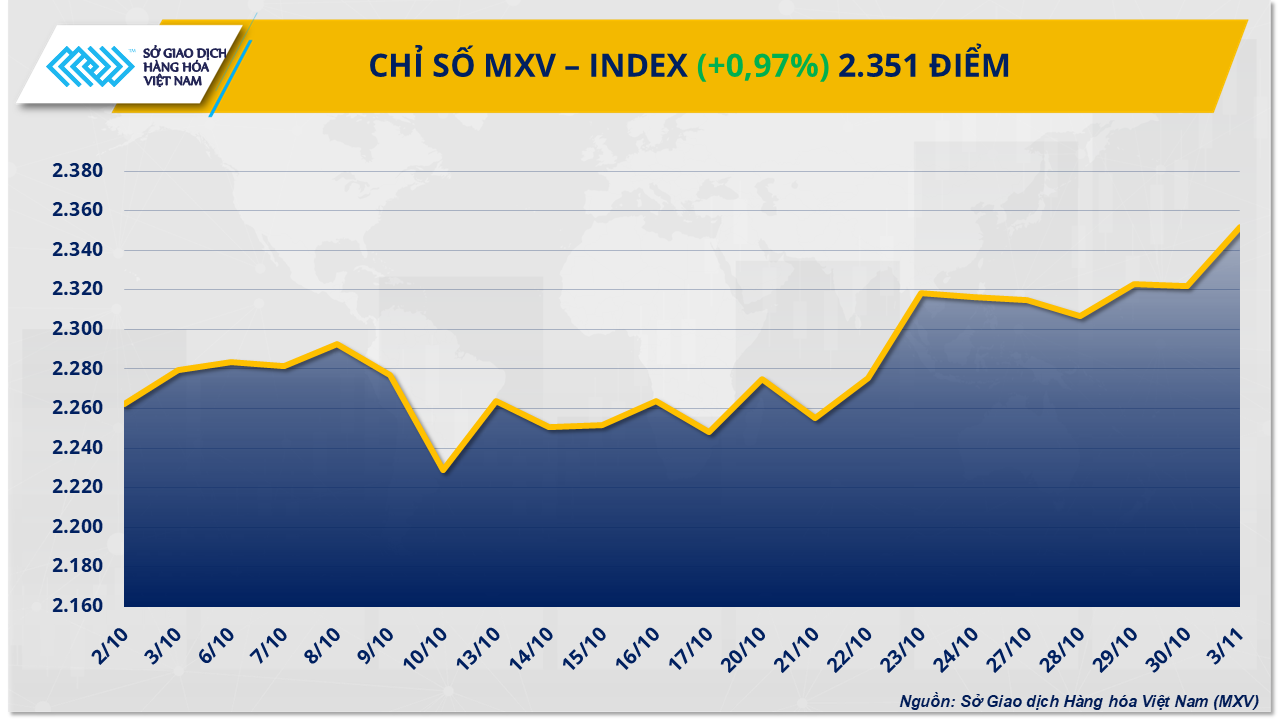
Concerns about supply are supporting coffee prices.
At the close of yesterday's trading session, the industrial raw materials market witnessed overwhelming buying pressure, with 7 out of 9 commodities simultaneously increasing in price. Notably, Arabica coffee prices rose by more than 3.7% to $8,965 per ton, while Robusta coffee prices also increased by more than 3.3% to $4,693 per ton.

According to the Vietnam Commodity Exchange (MXV), extreme weather in Vietnam and Brazil, the world's two leading coffee-producing countries, is raising concerns about crop damage, driving coffee prices up sharply in early week trading.
In Vietnam, the Central Highlands region – the country's main coffee-growing area – is expected to be directly affected by Typhoon Kalmaegi, which could reach levels 12-13 upon landfall. The typhoon is moving rapidly, accompanied by thunderstorms and heavy rain across a wide area from the night of November 6th to November 9th, affecting provinces from Quang Tri to Dak Lak, with the storm's center likely to make landfall in the area from Da Nang to Khanh Hoa. Prior to this, prolonged heavy rain had already disrupted harvesting in these provinces and raised concerns about a significant decrease in the 2025-2026 crop yield.
In Brazil, the world's largest coffee producer, dry weather continues to negatively impact yields. Rainfall in Minas Gerais, a key coffee-producing region, is currently only around 75% of average, threatening to further reduce production while global supply has yet to recover from the previous shortage. Although forecasts suggest potentially more favorable weather in Brazil in the coming weeks, investors remain cautious about the risk of continued market volatility due to increased supply and demand tensions.
Meanwhile, global coffee supplies are tightening, with some international sources indicating that US roasters have nearly exhausted their reserves. This makes the removal of the 50% tariff on Brazilian coffee even more urgent. Inventories of arabica coffee monitored by the ICE Exchange have fallen to their lowest level in nearly two years, at 431,481 bags as of the beginning of this week.
Robusta inventories also fell sharply, to just 6,053 lots – the lowest level in over three months.
On the domestic market, green coffee bean prices in Dak Lak yesterday remained generally stable, fluctuating around 116,000 - 116,500 VND/kg, amidst delays by dealers in quoting new purchase prices. Trading activity was generally subdued as both buyers and sellers cautiously observed weather developments.
In many areas such as Cu M'gar, Krong Nang, and Ea H'leo, people are rushing to harvest the ripening coffee beans before the storms return. However, the heavy and prolonged rainfall in recent days has disrupted the harvesting process, while also posing a risk of reduced bean quality and affecting the yield of the 2025-2026 crop if the bad weather continues.
World oil prices rose for the fourth consecutive session.
Following the general market trend, the energy sector also saw gains across all five commodities yesterday. Notably, the market continued to witness a slight recovery in world oil prices for the fourth consecutive session, despite OPEC+'s decision to continue increasing production in December.
At closing, both crude oil prices recorded a slight increase of 0.11%, with WTI crude settling at $61.05 per barrel, while Brent crude traded at $64.84 per barrel.

Last weekend, the Organization of Petroleum Exporting Countries and its allies (OPEC+) officially confirmed it will continue to increase production by 137,000 barrels per day in December. This is the third consecutive increase after October and November and is part of a plan to completely lift the 1.65 million barrels per day production cuts that have been in place since April 2023.
Nevertheless, analysts believe this increase is still quite modest and unlikely to put significant pressure on world oil prices. According to analysts at the consulting firm Ritterbusch and Associates: “Any negative impact on prices from OPEC’s push to increase production by 137,000 barrels per day this quarter will be offset by the organization’s proposal to pause production increases after the end of this year.”
Specifically, in the press release, OPEC+ stated that it will maintain production levels for at least the first three months of 2026. According to OPEC+, this decision was made due to the seasonal nature of the first quarter, which is often considered the weakest period in terms of supply and demand balance. This has helped to ease market sentiment regarding the risk of global oversupply in the short term.
In related developments, US natural gas prices extended their gains for the fourth consecutive session. At the close of trading, natural gas prices reached $4.27/MMBtu, up 3.44%. Earlier, in the final trading session of October, natural gas prices surpassed the $4/MMBtu mark for the first time since early March, driven by expectations of strong heating demand amid the approaching winter in Northern Hemisphere countries.
Source: https://baotintuc.vn/thi-truong-tien-te/caphe-dan-dat-da-tang-mxvindex-ve-dinh-8-thang-20251104083832854.htm







![[Image] A firsthand look at the "world's highest bridge" in China.](/_next/image?url=https%3A%2F%2Fvphoto.vietnam.vn%2Fthumb%2F1200x675%2Fvietnam%2Fresource%2FIMAGE%2F2026%2F02%2F05%2F1770258359911_01-cau-hoa-giang-995-jpg.webp&w=3840&q=75)






































































































Comment (0)